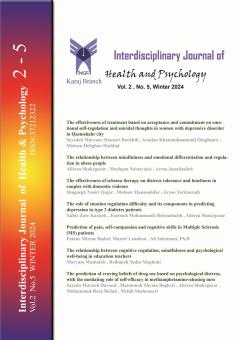The role of emotion regulation difficulty and its components in predicting depression in type 2 diabetes patients. (Authors: Xabiz Zare Karizek / Fatemeh Mohammadi Shirmahalleh / Alireza Shokrgozar)
Subject Areas : Emotion Regulation
1 - Assistant Professor - Faculty Member of Islamic Azad University, Karaj Branch
Keywords: depression, emotion regulation difficulty, type 2 diabetes,
Abstract :
Abstract This research was conducted with the aim of predicting depression based on the difficulty in regulating emotions and its components in people with type 2 diabetes. The research was descriptive-cross-sectional and correlational. All patients with type 2 diabetes referred to Armaghan diabetes clinic in Karaj city in 2011, numbering 218 people, formed the statistical population of the study, which was selected using the available sampling method and 200 people were selected as a sample and the research tools included a questionnaire. Revised depression and emotion regulation difficulty questionnaire answered. Data analysis was done at two levels of descriptive statistics and correlation coefficient test and multiple regression with SPSS-v26. The findings showed that there is a positive and significant correlation between the difficulty of emotion regulation and suffering from depression (r=0.545 and P<0.002). Also, the regression analysis showed that among the components of emotion regulation difficulty, respectively, the highest explanatory power of depression in diabetic patients is related to the non-acceptance of emotional responses (P<0.05 and β=0.209) and the lowest explanatory power is related to It was difficult to use targeted behaviors (P<0.05 and β=0.060). Based on the research findings in medical centers, it is necessary to pay attention to the antecedents of depression and improve emotional regulation to increase the general health of people with diabetes.
منابع
امینی، فاطمه؛ سجادیان، ایلناز و ثالثی، منصور. (1400). رابطه باورهای مرتبط با درد و اضطراب با افسردگی در بیماران مبتلا به آرتریت روماتوئید. مجله درد و بیهوشی، 11(1)، 37-25.
ایمانی، سعید؛ الخلیل، یاسمین و شکری، امید. (1398). رابطه نگرش های ناکارآمد با اضطراب اجتماعی در نوجوانان: نقش میانجیگر تنظیم هیجان. مجله مطالعات روانشناسی تربیتی، 16(33)، 28-1.
تفنگچی، مریم؛ رئیسی، زهره؛ قمرانی، امیر و همکاران. (1400). تدوین بسته ارتقای تحمل پریشانی و مقایسه اثربخشی آن با درمان مبتنی بر شفقت بر خودانتقادی، ترس از ارزیابی منفی و اضطراب در زنان مبتلا به سردردهای تنشی مزمن. مجله علوم روانشناختی، 20(100)، 634-621.
خاکشورشاندیز، فاطمه؛ سوداگر، شیدا؛ عنانی سراب، غلامرضا و همکاران. (1400). اثربخشی شناخت درمانی مبتنی بر ذهن آپاهی بر آمیختگی شناختی و عاطفه مثبت و منفی زنان مبتلا به دیابت نوع دوم. مجله پرستاری دیابت، 9(2)، 1430- 1419.
دوراندیش، فخری؛ روزبان، ثریا؛ شهنی فیض، کوثر و ابوذری، فاطمه. (1401). بررسی نقش دشواری در تنظیم هیجان، تحمل آشفتگی و استرس ادراک شده در پیش بینی پیروی از درمان در بیماران مبتلا به دیابت نوع دوم. مجله مدیریت پرستاری، 11(3):48-36.
دادفرنیا، شکوفه؛ هادیان فرد، حبیب؛ رحیمی، چنگیز و همکاران. (1399). تنظیم هیجان و نقش آن در پیش بینی نشانه های افسردگی در دانشجویان. مجله طلوع بهداشت یزد، 19(1)، 47-32.
داودیان، ملیکا؛ هاشمی پور، فرحناز؛ قلیچ خان، ناهید و همکاران. (1401). نقش انعطاف پذیری روانشناختی، دشواری در تنظیم هیجان و عدم تحمل ابهام در پیش بینی پریشانی روانشناختی و وسواس فکری-عملی در بیماران مبتلا به دیابت نوع دو در طول اپیدمی کرونا. فصلنامه مدیریت پرستاری، 11(2)، 77-65.
رامتین فر، هاله و علیزاده، ماندانا. (1399). رابطه طرحواره های ناسازگار اولیه با هوش هیجانی و تنظیم هیجان در سالمندان مبتلا به دیابت. مجله پرستاری و مامایی کردستان، 6(3)، 87- 77.
رامش، سمیه؛ قاضیان، مونا؛ رفیعی پور، امین و همکاران. (1397). نقش واسطه ای افسردگی و اضطراب بین تنظیم هیجان و خودمراقبتی در مبتلایان به دیابت نوع دو. مجله علمی پژوهان، 16(4)، 45-37.
گنجی، مهدی و گنجی، حمزه. (1400). آسیب شناسی روانی براساس DSM-5. تهران: نشر ساوالان.
لطفی، مژگان؛ امینی، مهدی و شیاسی، یاسمن. (1400). مقایسه مدلهای دورن فردی و بین فردی تنظیم هیجان در تبیین نشانگان اضطراب و افسردگی. مجله روانپزشکی و روانشناسی بالینی ایران، 27(3)، 301-288.
وطن خواه، فرزانه؛ شمس، سارا؛ رشتیانی، فریبا و همکاران. (1400). رابطه بین سیستم های مغزی-رفتاری و دشواری در تنظیم هیجان با علائم افسردگی در افراد مبتلا به دیابت نوع دو نقش میانجی انعطاف پذیری شناختی. مجله رویش روانشناسی، 10(11)، 256-241.
Ajele, W. K., Oladejo, T. A., Akanni, A. A & et al. (2021). Spiritual intelligence, mindfulness, emotional dysregulation, depression relationship with mental well-being among persons with diabetes during COVID-19 pandemic. Journal of Diabetes & Metabolic Disorders, 20(2), 1705-1714.
Belmon, A. P., & Auxillia, J. (2023). Music Therapy: A Best Way to Solve Anxiety and Depression in Diabetes Mellitus Patients. In Advances in Speech and Music Technology: Computational Aspects and Applications (pp. 237-247). Cham: Springer International Publishing.
Beam, A. B., Wiebe, D. J., & Berg, C. A. (2021). Insulin Restriction, Emotion Dysregulation, and Depressive Symptoms in Late Adolescents with Diabetes. Journal of pediatric psychology, 46(9), 1110-1118.
Coccaro EF, Drossos T, Kline D, Lazarus S, Joseph JJ, de Groot M. (2022). Diabetes distress, emotional regulation, HbA1c in people with diabetes and A controlled pilot study of an emotion-focused behavioral therapy intervention in adults with type 2 diabetes. Prim Care Diabetes. 16(3):381-386.
DeClercq, V., & Sweeney, E. (2022). Age and sex-specific associations in health risk factors for chronic disease: evidence from the Atlantic Partnership for Tomorrow’s Health cohort. Canadian Journal on Aging/La Revue canadienne du vieillissement, 41(2), 164-175.
Erhardt, E., Murray-Krezan, C., Regino, L & et al. (2023). Associations between depression and diabetes among Latinx patients from low-income households in New Mexico. Social Science & Medicine, 115713.
Fawzy, A. M., Rivera‐Caravaca, J. M., Underhill, P & et al. (2023). Incident heart failure, arrhythmias and cardiovascular outcomes with sodium‐glucose cotransporter 2 (SGLT2) inhibitor use in patients with diabetes: Insights from a global federated electronic medical record database. Diabetes, Obesity and Metabolism, 25(2), 602-610.
He, T., Wang, W., Li, R & et al. (2022). Treatment of Diabetes Complicated with Depression from Liver and Lien. MEDS Clinical Medicine, 3(4), 110-114.
Heumann, M., Röhnsch, G., & Hämel, K. (2022). Primary healthcare nurses’ involvement in patient and community participation in the context of chronic diseases: An integrative review. Journal of Advanced Nursing, 78(1), 26-47.
Kane, N. S., Hoogendoorn, C. J., Tanenbaum, M. L & et al. (2018). Physical symptom complaints, cognitive emotion regulation strategies, self‐compassion and diabetes distress among adults with Type 2 diabetes. Diabetic Medicine, 35(12), 1671-1677.
Kaur, H., Scholl, J. C., & Owens-Gary, M. (2022). Depression and Diabetes in Workers Across the Life Span: Addressing the Health of America’s Workforce—Behavioral Risk Factor Surveillance System, 2014–2018. Diabetes Spectrum, 35(2), 198-206.
Klein, S., Gastaldelli, A., Yki-Järvinen, H & et al. (2022). Why does obesity cause diabetes?. Cell metabolism, 34(1), 11-20.
Palomo-Osuna, J., Dueñas, M., Naranjo, C., De Sola, H., Salazar, A., & Failde, I. (2022). Factors related to cognitive function in type-2 diabetes and neuropathic pain patients, the role of mood and sleep disorders in this relationship. Scientific Reports, 12(1), 1-13.
Sun, J., Luo, Y., Chang, H & et al. (2020). The mediating role of cognitive emotion regulation in BIS/BAS sensitivities, depression, and anxiety among community-dwelling older adults in China. Psychology Research and Behavior Management, 13, 939.
Turin, A., & Radobuljac, M. D. (2021). Psychosocial factors affecting the etiology and management of type 1 diabetes mellitus: A narrative review. World Journal of diabetes, 12(9), 1518.
Zeifman, R. J., Antony, M. M., & Kuo, J. R. (2020). When being imperfect just won't do: Exploring the relationship between perfectionism, emotion dysregulation, and suicidal ideation. Personality and Individual Differences, 152, 109612.

